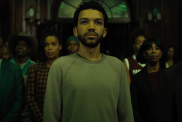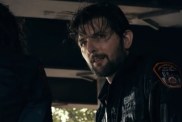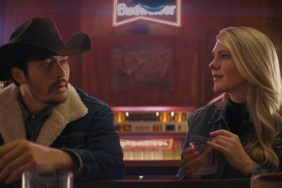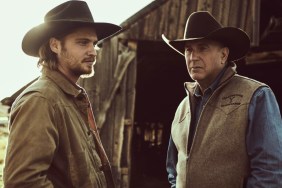A little over twenty years ago, actor Mickey Rourke was at the top of his game, giving critically acclaimed performances in movies like Barfly and 9 1/2 Weeks and Angel Heart and destined to be a Hollywood movie star on par with Bruce Willis in terms of his potential. Then something happened, much of it revolving around the reputation Rourke created for himself of being difficult to work with. By 1991, Rourke had decided to give up acting in favor of returning to his first love as a trained boxer, though he’d eventually return for small roles in movies by Robert Rodriguez and Tony Scott, and reminding everyone of his greatness when Rodriguez hired him to play Marv in Frank Miller’s Sin City.
A few years on, Rourke is having what many are considering his comeback in Darren Aronofsky’s The Wrestler in which he plays Randy “The Ram” Robinson, a wrestler twenty years past his prime who is trying to continue making a living in the ring despite health problems that might kill him if he continues. As Randy recovers from a heart attack, he bonds with his estranged daughter (Evan Rachel Wood) and an attractive and caring stripper (Marisa Tomei).
Rourke is far from past his prime, but there are so many parallels between the characters one can’t help but feel that the actor was drawing from something within himself or his own past when creating the character of Randy “The Ram.”
We heard a little from Rourke during the press conference at the New York Film Festival, but at the recent junket in New York, we were able to find out a little more from the veteran actor about the role and how he’s handling being rediscovered by those who thought his career was over.
ComingSoon.net: What did you think of the script for “The Wrestler” when you read it, and did you immediately know how to play this character?
Mickey Rourke: I didn’t really care for the script. I thought that whomever wrote the script hadn’t spent as much time as I had around these kind of people and he wouldn’t have spoken the way this dude was speaking at the time, so Darren let me rewrite all my part and he put the periods in and crossed the t’s. So once we made that change I was okay with it.
I wanted to work with Darren, but I didn’t really want to make a wrestling movie because, coming from boxing, wrestling, you’re kind of like, “I’m not doing that sh*t.” That’s where my head was at. To me it was almost disrespecting… I don’t know. I had some hang-up about wrestling because it was pre-arranged and pre-choreographed almost like a dance, instead of real combat. Once I got over that hurdle, there was a camaraderie with me going, “It’s OK to do this; it’s a movie.” I had that in my head for a while, plus it was hard for me. Everything I’d been taught for 20 years to do, I had to do like this now. Everything I was taught to hide and move a certain way, gracefully, now it was like all this lumbering bullsh*t and all this kind of crap, and I didn’t feel natural doing it. I kept getting hurt. I think I had three MRIs in two months, because I wasn’t landing right. These guys take several years to learn how to land. After I started getting hurt doing it, I started to realize these guys are really suffering, and I kind of gained a respect for their sport. In between, we had pretty much choreographed it so any half-ass athlete could do it and then one of the pro-wrestler guys, he was very acrobatic. He would get bored and he started doing these flips and sh*t and these scissors and I was like, “We should put that in the f*cking movie!” I’d go in on Sundays without telling Darren, and I learned three or four really hard moves I shouldn’t have been able to pull off. This guy was really patient with me and I really wanted to look as good as I could. It was like competing with myself and also competing with time. This sh*t, I don’t know if I could do in my 20s. By the time we got done doing it, he said to me, “80 percent of the guys in the WWE can’t do that sh*t” and I said, “Wow!”

When you start to look at all the wrestling tapes from years ago, it sort of transcended from just big fat guys in funny-looking bathing suits to guys who are really, really talented and put a lot of work into their bodies. You’ve got to cross the line to get your body into a certain type of shape in a way other than working out, which can be detrimental. It’s like the scene in the locker room where they’re all discussing the pharmaceutical end of it and it happens. I haven’t been in a gym yet where you’re not listening to that kind of conversation, and you go: “Oh, really? Does that sh*t do that?” Even though that’s like a taboo, I said to Darren, it’s important that it’s in there. I didn’t want to mention any movies but this is not a movie where the guy wins the championship and there’s a happy f*cking ending. I can’t make a comparison but these guys just fade away.
We were in L.A doing a question and answer thing and Darren had said, “Oh, there’s a guy from the ’80s out in the audience named Rowdy Roddy Piper. Are you here?” There was silence. “We want to know what you think about our movie.” I’m like, “Oh, God.” It was a lot of weight because Rowdy was really great at what he did and I was thinking “Oh, man. Did we push the envelope too far with some of those scenes or disrespect anybody?” He says, “Yeah, I’m here” and then we looked at each other and went, “Oh, f*ck.” (laughter) Darren goes, “Do you have anything to say? Did you like it? Did you hate it?” And he goes, “Yeah, I got something to say.” He gave us nothing but the most complimentary kind of sh*t, and then he came back stage and broke down actually. He was just emotional about the identification with what happened to him and a lot of guys that are athletes when the clock goes by, and they say, “Well, look, we’re going to replace you with so-and-so.” The message is sort of universal with any kind of pro sport or what have you.
CS: You’ve talked about how you got physically ready to play the role, so where did you go to get emotionally ready to play Randy “The Ram” Robinson? What did you draw on?
Rourke: Just personal stuff. Personal, painful sh*t. One of the reasons when I was replaced early on (in the production), I was kind of the only one who was glad about it, because I knew a guy like Darren would want me to really go there and bring it. I didn’t know if I wanted to work that hard for this fella… for free. (laughter) I was really relieved when I was told I was replaced. I was back in Miami hanging out, going to the gym, just lifting weights casually, having a good time, then I got a call from my agent and he said, “You’re back in!” and I said: “Aw f*ck! This pays sh*t.” I think the smarter side of my brain said, “You better get yourself in shape and do this movie for free and work with this guy that has fought so hard for you to be in this movie.” Thank God I did. He stuck by me. He really had to convince them.
CS: Did you find playing “The Ram” therapeutic at all?
Rourke: Unfortunately, yes. From a distance, I’m sitting here going “Wow, I’m glad I made certain choices in my life or I had access to get information to make the changes I had to make to continue on” where he doesn’t have that accessibility and so that’s why he’s got to jump off that high rope one more time, because it’s too painful living in that f*cking trailer. He’s not going to get a second chance.
CS: How do you shake off playing a character like that at the end of the day?
Rourke: You don’t. You really don’t. I mean, I don’t stay in character all the time; I’m not one of those. But there are certain parts of it, you lose pieces of yourself with each role you do, some people anyway, and this one took a big chunk out of me.

CS: How are you handling all this attention?
Rourke: It’s new. I had 13 years to think about it. After 10 years, you think the party’s over. You gotta be realistic and think, “I was there, I blew it and it’s too f*cking late.” Ten years is a long time to think something’s going to happen and it don’t happen. It’s like waiting for a girlfriend to come back or something.
CS: Can you talk a little about the Springsteen song that ends the film?
Rourke: The only reason I wrote Bruce Springsteen a letter was because after about six days, I knew something magical was happening on the movie. Darren sort of brought me back to just really wanting to be the best thing I could be. Stuff started happening with Evan and then stuff made it personal with the speech at the end and the way Darren was shooting the movie and his direction. I felt this tremendous sense of pride and privilege to be associated with Darren and the people in this movie, and that’s what gave me the gumption to write Bruce. I told him, “We have no money, but we did it in New Jersey…”
CS: What did you think of the song when you first heard it?
Rourke: I had to listen to it like 100 times. He really got it. The song sums up the whole character. He did me such an honor and such a favor.
CS: How do you feel the business has changed since you were acting in the ’80s?
Rourke: I don’t know what’s really gotten better about the business. I think it stays the same. The wheel turns. The young people work, the older people survive and then finally the older ones die off and a new group comes in. It’s still the same grind. I’ve read a lot of biographies, and reading everyone from Monty Cliff to Errol Flynn, it’s the same sh*t. It’s the same thing where you take people who are tremendously talented and over a period of time, the power, the money, the fame doesn’t fill the gaps and the emptiness that comes along with the ride.
CS: I’m sure you’ve heard about the Oscar buzz, and at this point, many people who’ve known your ’80s work felt you should have been recognized for “Barfly” and other roles. This time around, do you think you’ll approach the awards season differently?
Rourke: Well, I didn’t behave myself the first time around. I didn’t have any rules. I wasn’t accountable. I wasn’t responsible. I wasn’t a professional. I didn’t understand the politics of the business end of it. So, you’re going to lose favor out there. After 13 years of being out of work, I understand what the game is now. I wasn’t educated enough to understand it, that it was a business. When I got out of the Actors’ Studio, I thought it was all about acting. I didn’t know it was about shaking hands and kissing ass and having a certain amount of talent. You can be mediocre as an actor and be a f*cking movie star. I’m not complaining about that, but I never thought those were the rules. Then again, I made up my own rules, so that was all in my head and that was my fault that I thought about it that way. For some reason, I made it this precious, precious thing; otherwise I couldn’t have studied and worked as hard as I did. When I walked into the Actors’ Studio, and I saw Al Pacino and Christopher Walken and Harvey Keitel and Robert De Niro, and I thought “F*ck, I want to be an actor one day like that” and the only way you could do that was doing road work for a fight. You do your homework and break your ass harder than everybody else.
CS: How do you feel about your potential Oscar competition?
Rourke: I love competition. Bring it. But I like Sean’s performance in “Milk,” I thought he gave it a great effort and did a really good job. I think that’s the only one I went to.
The Wrestler opens in select cities on Wednesday, December 17. Look for our interview with director Darren Aronofsky sometime in the next few weeks.









